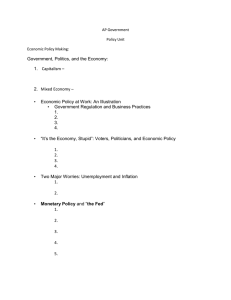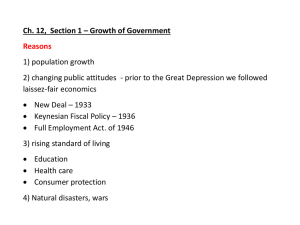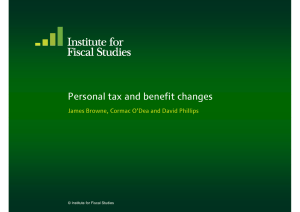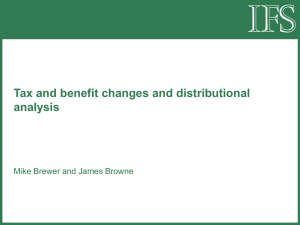Distributional analysis of tax and benefit changes James Browne
advertisement
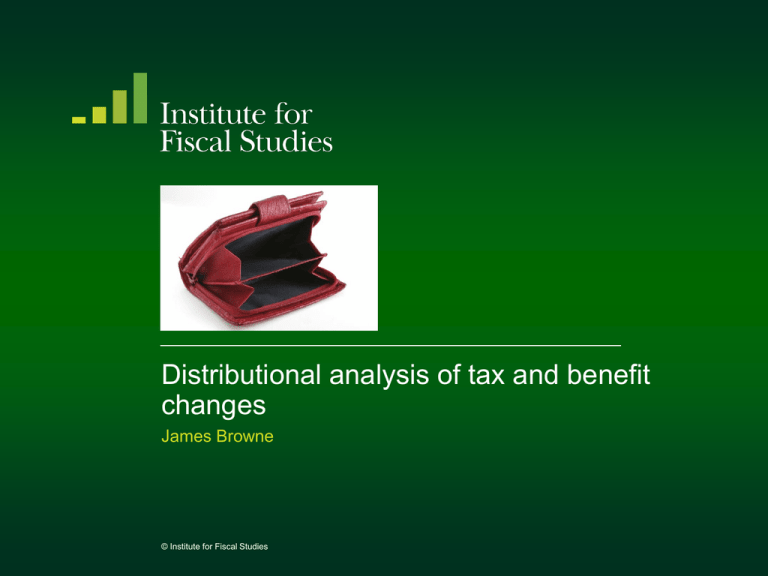
Distributional analysis of tax and benefit changes James Browne © Institute for Fiscal Studies Distributional impact of tax and benefit changes: the HMT view • HMT: yesterday’s welfare changes were regressive, but overall package of tax and benefit changes by 2012–13 is progressive • HMT assessment cannot tell us about the overall distributional impact. It: – includes only measures ‘where there is sufficiently robust data available to attribute changes in tax, tax credits or benefits to individuals’ – this ignores a third of the changes due to take place by 2012-13 – includes only measures to be introduced by 2012–13 because Government ‘will take a view on tax and welfare policy [affecting 2014-15] based on the emerging fiscal position in future fiscal events’; also behavioural responses important in medium-run – so looks at a year in which the welfare savings are just £7.3bn, not £18bn © Institute for Fiscal Studies Distributional impact of tax and benefit changes: can we do better? • HMT omit impact of following reforms – Housing Benefit – Employment and Support Allowance – Disability Living Allowance – the way in which in-year income changes affect tax credit awards – Council Tax Benefit • These are all likely to affect poorest half more than richest half • We think we can roughly estimate the likely distributional impact • Means our estimates will be more complete, but less precise • Throughout we assume that there is no behavioural response, and that reforms do not change pre-tax prices in the economy – More plausible in some cases than others (e.g. VAT, Housing Benefit) © Institute for Fiscal Studies Distributional impact of welfare measures announced in the Spending Review to be in place by 2012–13 0.0% Change in net Income -0.2% -0.4% -0.6% -0.8% IFS HMT -1.0% -1.2% -1.4% Poorest 2 3 4 5 6 Income Decile Group © Institute for Fiscal Studies 7 8 9 Richest Distributional impact of welfare measures announced in the Spending Review to be in place by 2014–15 0.0% Change in net Income -0.2% -0.4% -0.6% -0.8% -1.0% -1.2% Assumes councils means-test CTB more aggressively -1.4% Poorest 2 3 4 5 6 Income Decile Group © Institute for Fiscal Studies 7 8 9 Richest Distributional impact of SR welfare cuts • Welfare cuts announced yesterday are regressive according to both our and HMT’s analysis – Less regressive once impact of Child Benefit cut fully in place – Remaining omission is impact of Universal Credit • What about overall impact of tax and benefit changes to be introduced over the next few years? © Institute for Fiscal Studies Distributional impact of tax and benefit measures to be in place by 2012–13 Change in net Income £0 0% -£500 -1% -£1,000 -2% -£1,500 -3% -£2,000 -4% -£2,500 -5% -£3,000 -6% -£3,500 -7% -£4,000 -8% Poorest © Institute for Fiscal Studies 2 3 4 5 6 7 8 Income Decile Group Announced by previous government June Budget CSR Total as a % of income (right axis) Total as a % of expenditure (right axis) HMT total as a % of income (right axis) 9 Richest Distributional impact of tax and benefit measures to be in place by 2014–15 Change in net Income £0 0% -£500 -1% -£1,000 -2% -£1,500 -3% -£2,000 -4% -£2,500 -5% -£3,000 -6% -£3,500 -7% -£4,000 -8% Poorest © Institute for Fiscal Studies 2 3 4 5 6 7 8 Income Decile Group Announced by previous government June Budget CSR Total as a % of income (right axis) Total as a % of expenditure (right axis) 9 Richest Distributional impact of tax and benefit measures to be in place by 2014–15 Change in net Income £0 0.0% -£500 -1.5% -£1,000 -3.0% -£1,500 -4.5% -£2,000 -6.0% -£2,500 -7.5% -£3,000 -9.0% Lowest © Institute for Fiscal Studies 2 3 4 5 6 7 8 Expenditure Decile Group Announced by previous government June Budget CSR Total as a % of income (right axis) Total as a % of expenditure (right axis) 9 Highest Distributional impact of tax and benefit measures to be in place by 2014–15: by family type 0% Change in net Income -1% -2% -3% -4% -5% -6% -7% -8% Poorest 2 3 4 5 6 7 8 Income Decile Group Families with children © Institute for Fiscal Studies Pensioners Others 9 Richest Conclusions • Welfare cuts announced yesterday are regressive, less so once child benefit cut fully in place • Overall, richest tenth lose most, but because of Labour’s tax rises • HMT say that package of tax and benefit reforms to be introduced by 2012-13 is progressive (apart from bottom income decile) • We disagree. Having considered all welfare cuts: • Reforms by 2012–13 are slightly regressive or flat within bottom nine-tenths of households • Reforms by 2014–15 are more clearly regressive within bottom 90% • The regressive impact is the result of reforms announced by the current Government both in the June Budget and in SR • Families with children the biggest losers • HMT said that reforms will not increase relative child poverty over © Institute for Fiscal Studies next two years. Maybe, but what about future years?
